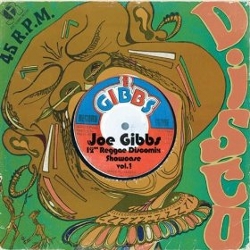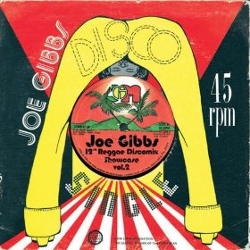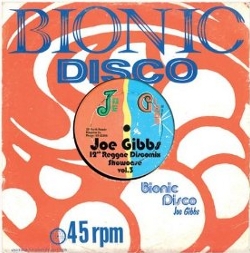Articles about reggae music, reviews, interviews, reports and more...
Joe Gibbs: 12" Reggae Showcase Volumes 1, 2 and 3

Joe Gibbs: 12" Reggae Showcase Volumes 1, 2 and 3
A three-volume ‘showcase’ of 12" versions that completes the essential Gibbs catalogue.
Sampler
The enormous influence of Joe Gibbs (Joel Gibson) on the development of reggae is widely recognised. Together with Errol Thompson at the mixing desk, the ‘Mighty Two’ had a key role in the emergence of dub, the sound of legendary names including Dennis Brown, Marcia Aitken and Culture, and the commercial success of reggae for a mass audience beyond Jamaica that still managed to stay true to its roots. After opening his studio in Duhaney Park in the 1960s, Gibbs moved to a new multi-track studio in Retirement Crescent in the mid-70s where the Mighty Two were to define the sound of the key late-70s period in reggae, just before the music would change direction during the digital age. Released in three separate volumes, this definitive collection draws from that period - and that studio - and amply demonstrates the reasons for Gibbs’ outstanding reputation. The backing rhythms are excellent throughout, as you’d expect from a roll-call of musicians including Tommy McCook, Tony Chin and Sly and Robbie. Productions from Gibbs and Thompson always had a distinctive sound, softer and subtler in its execution than some of his contemporaries. There is a typical simplicity to the mixes and dubs here. The bass is prominent but the percussion is invariably light. Each track on this new release is featured in its extended 12” mix version, so we have some insight into how Gibbs and Thompson let the rhythms develop.
 Volume One sets the pattern, opening with ‘Feeling Soul’ from Ruddy Thomas; the sound is essential Joe Gibbs: gentle roots music, keyboard and bass holding it together, going straight into the version from Trinity over a bass line mixed up-front. Next up is Marcia Aitken with ‘My Man’, together with its 12” version, again by Trinity, with a characteristic take on ‘Blouse and Skirt’. Also on Volume One can be found the Mighty Diamonds, Junior Murvin, and the coupling of Dennis Brown and Prince Mohammed (a combination best known in the UK for Gibbs’ production of the classic re-recorded hit ‘Money in my Pocket’), here offering ‘How Can I Leave You’. These are not the usual well-worn reggae tunes re-released yet again. Some of these songs will be unfamiliar even to those close to reggae. A case in point is the excellent ‘A Win Them’ by Leo Graham, coupled with I-Roy’s treatment of the rhythm in the form of ‘News Carrier’ over the top of snatches of Leo Graham’s vocal. The distinctive chords of ‘Riding for a Fall’ will be more familiar, though in this incarnation it is not by John Holt, but is a lesser known version from George Nooks, with accompanying 12” dee-jaying from Welton Irie.
Volume One sets the pattern, opening with ‘Feeling Soul’ from Ruddy Thomas; the sound is essential Joe Gibbs: gentle roots music, keyboard and bass holding it together, going straight into the version from Trinity over a bass line mixed up-front. Next up is Marcia Aitken with ‘My Man’, together with its 12” version, again by Trinity, with a characteristic take on ‘Blouse and Skirt’. Also on Volume One can be found the Mighty Diamonds, Junior Murvin, and the coupling of Dennis Brown and Prince Mohammed (a combination best known in the UK for Gibbs’ production of the classic re-recorded hit ‘Money in my Pocket’), here offering ‘How Can I Leave You’. These are not the usual well-worn reggae tunes re-released yet again. Some of these songs will be unfamiliar even to those close to reggae. A case in point is the excellent ‘A Win Them’ by Leo Graham, coupled with I-Roy’s treatment of the rhythm in the form of ‘News Carrier’ over the top of snatches of Leo Graham’s vocal. The distinctive chords of ‘Riding for a Fall’ will be more familiar, though in this incarnation it is not by John Holt, but is a lesser known version from George Nooks, with accompanying 12” dee-jaying from Welton Irie.
 The second volume again covers the end of the 70s and the beginning of the 80s, signalling that the existing reggae tradition was still going strong, and adapting. ‘Tribal War’ by George Nooks (with abrupt change into the lively ‘Jah Did It’ version from Prince Weedy) is in the classic roots tradition, again with uncluttered Gibbs and Thompson production. By this time some synthesised sounds are starting to make their appearance in the mix. ‘Rope in’ from Cornell Campbell places the synthesiser squeaks of then-contemporary disco more fully into the mix, although this strangely sounds more dated now than music from ten years earlier. Cornell Campbell also adds ‘Two Timer’ to Volume Two, a strong song which overcomes the time of its creation, and, in its 12” form here, leads into a powerful version (‘Video Man’) from Trinity. This volume is a little uneven – lurching into MOR territory at one or two points - but there are strong songs, particularly those in the roots tradition, including ‘Jah Guide’ from Naggo Morris, and Horace Andy’s ‘Praise Him’ (together with the latter’s 12” partner, ‘Babylon Happening’ from Jah Mike). The inclusion of Culture’s ‘Innocent Blood’ (dee-jayed by U-Brown in ‘Rock it Up’) is a particular joy to behold.
The second volume again covers the end of the 70s and the beginning of the 80s, signalling that the existing reggae tradition was still going strong, and adapting. ‘Tribal War’ by George Nooks (with abrupt change into the lively ‘Jah Did It’ version from Prince Weedy) is in the classic roots tradition, again with uncluttered Gibbs and Thompson production. By this time some synthesised sounds are starting to make their appearance in the mix. ‘Rope in’ from Cornell Campbell places the synthesiser squeaks of then-contemporary disco more fully into the mix, although this strangely sounds more dated now than music from ten years earlier. Cornell Campbell also adds ‘Two Timer’ to Volume Two, a strong song which overcomes the time of its creation, and, in its 12” form here, leads into a powerful version (‘Video Man’) from Trinity. This volume is a little uneven – lurching into MOR territory at one or two points - but there are strong songs, particularly those in the roots tradition, including ‘Jah Guide’ from Naggo Morris, and Horace Andy’s ‘Praise Him’ (together with the latter’s 12” partner, ‘Babylon Happening’ from Jah Mike). The inclusion of Culture’s ‘Innocent Blood’ (dee-jayed by U-Brown in ‘Rock it Up’) is a particular joy to behold.
 Volume Three covers the same period, but with more signs of where reggae would now be heading with the inclusion of ‘Virgin Girl’ by Eek A Mouse (and its lesser-heard 12” counterpart in the form of ‘Lovers Take Over’ by Lui Lepkie), signposting the digital future. There are some familiar rhythms here, for instance the loping Pass-the-Kutchie style bass on Barry Brown’s ‘Tourist Season’ but there is plenty that will be less familiar. This third volume closes with the venerable Freddie McGregor (alongside 12” collaborator Shorty the President) but the standout track is ‘Windy Day’ from Ruddy Thomas, its sharp ska-influenced brass and bass leading straight into Trinity’s dubbed-up version on the same rhythm. This has all the hallmarks of the Joe Gibbs sound: clarity, simplicity, a driving bass pattern, a lack of studio gimmickry and a sense of commitment to the music.
Volume Three covers the same period, but with more signs of where reggae would now be heading with the inclusion of ‘Virgin Girl’ by Eek A Mouse (and its lesser-heard 12” counterpart in the form of ‘Lovers Take Over’ by Lui Lepkie), signposting the digital future. There are some familiar rhythms here, for instance the loping Pass-the-Kutchie style bass on Barry Brown’s ‘Tourist Season’ but there is plenty that will be less familiar. This third volume closes with the venerable Freddie McGregor (alongside 12” collaborator Shorty the President) but the standout track is ‘Windy Day’ from Ruddy Thomas, its sharp ska-influenced brass and bass leading straight into Trinity’s dubbed-up version on the same rhythm. This has all the hallmarks of the Joe Gibbs sound: clarity, simplicity, a driving bass pattern, a lack of studio gimmickry and a sense of commitment to the music.
Errol Thompson died in 2004 and Joe Gibbs died in 2008. Over the years both Gibbs and Thompson worked with other producers who would become major figures in the music, including Niney the Observer. The house band and generic name for the Gibbs studio musicians - the Professionals – were crucial in the growth of reggae. Alongside this new collection, other seminal Gibbs releases worthy of anyone’s attention include 'African Dub' chapters 1 to 4, groundbreaking in their original vinyl releases between 1975 and 1979, and later gathered together in a CD box set with highly informative track-by-track information by VP Records (2007). Similarly, ‘Two Sevens Clash’ by Culture remains a milestone album in the development of reggae, its typically unassuming Gibbs and Thompson production contrasting with the uncompromising mood of the songs; released in 1977, its CD release by Shanachie Records in 2007 includes additional versions and dubs and an appearance by I-Roy.
During his career Gibbs produced many straightforward hits for the mainstream charts by the likes of Nicky Thomas but in popularising reggae he always retained its soul. The release of these 12” versions as a three-volume ‘showcase’ completes the essential Gibbs catalogue.
© December 2009 - John Fenwick for reggaemusic.org.uk
Read more about this topic
Comments actually desactivated due to too much spams
Browse by categories
Recommended Articles
Latest articles
Recently addedView all
© 2007-2026 United Reggae. All Rights Reserved. Reproduction in whole or in part is prohibited. Read about copyright
Terms of use | About us | Contact us | Authors | Newsletter | A-Z














